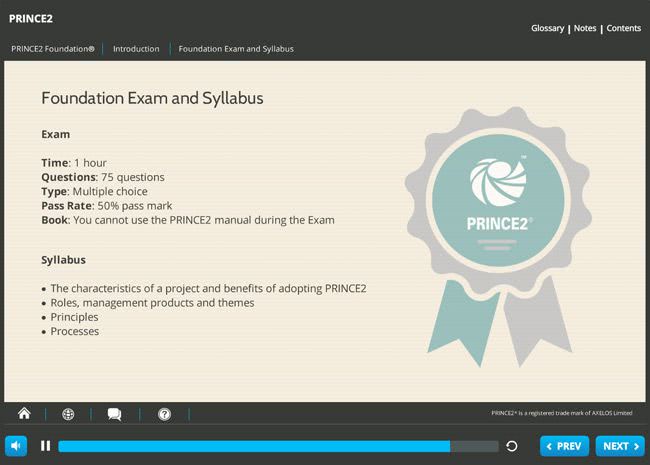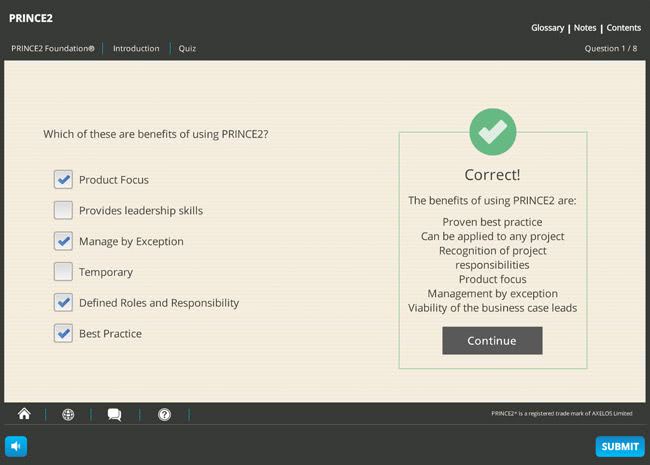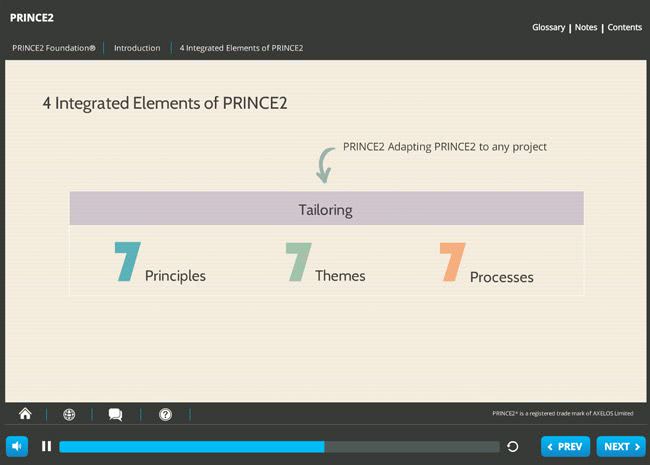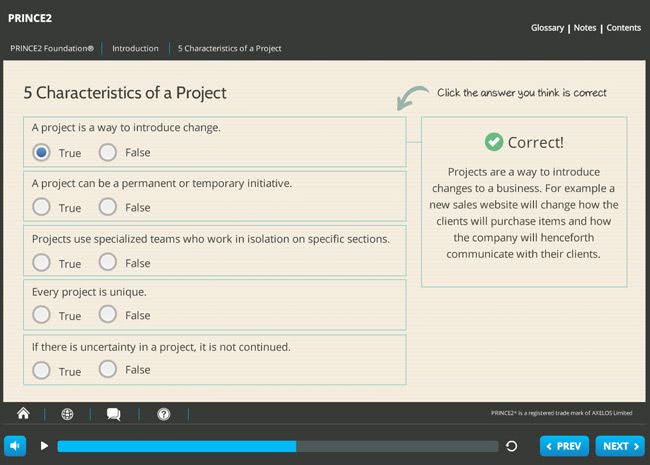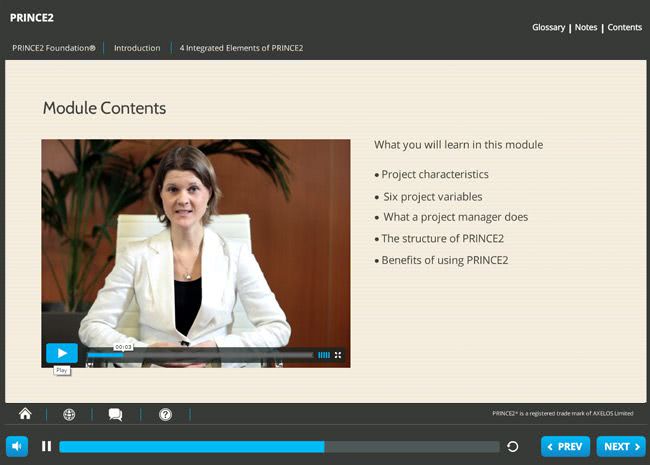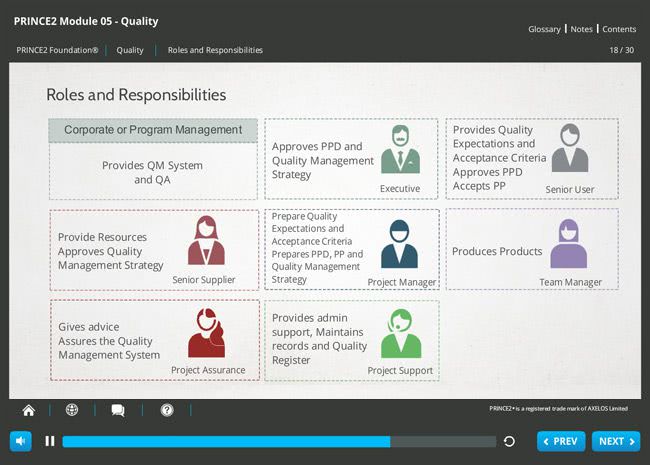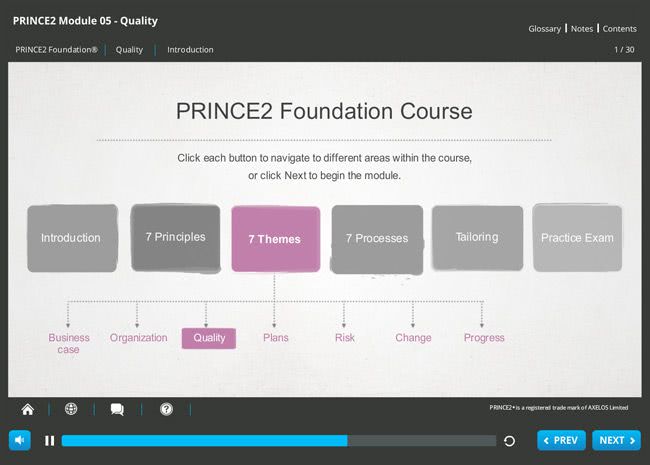Project Management:
PRINCE2® 6th Edition Practitioner
6 months e-learning + exam voucher
€719 + VAT
“Project Manager
is a person who believes
nine women can deliver a baby
in one month.”
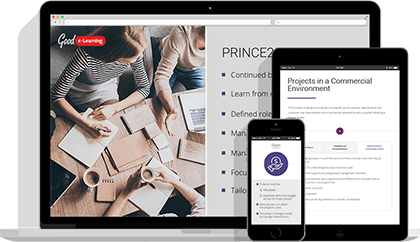
€489.00Add to cart
€489.00Add to cart
Project Management:
PRINCE2® 6th Edition Practitioner
E-learning + Web-based examination
€489.00Add to cart
Key information about this course:
Price: 719 € + VAT ( 6 month E-learning + Exam Voucher)
- 14+ hours of course material included
- Fully accredited training course
- Expert tutor support
- Fully mobile compatible
- 6 months access – start today!
- FREE Exam voucher

Continuing on from PRINCE2 Foundation which is a pre-requisite, this course offers everything students need to prepare for the PRINCE2 Practitioner exam. Candidates will learn how to apply and adapt the principles of PRINCE2 in practice, ensuring that they are prepared to utilize the methodology in real-world projects. Students will reinforce their new knowledge through practice examinations, and they can also have any questions answered by our in-house team of experienced tutors.
At the end of the course, students will be able to request a FREE exam voucher in order to take the official PRINCE2 Practitioner examination. Keep in mind that students must first pass the PRINCE2 Foundation exam before they can move on to Practitioner level. Upon successfully completing both exams, students will be fully certified in PRINCE2.
This course provides an excellent next step for users who have already completed a PRINCE2 Foundation course and exam. It demonstrates how the theory learned at Foundation level can be applied in practice, ensuring that students are prepared to apply and adapt the principles of the PRINCE2 project management methodology.
The flexibility of PRINCE2 has helped to make it one of the world’s most popular frameworks for project management. A full PRINCE 2 certificate will demonstrate your ability to utilize and apply the methodology, making this course highly valuable for aspiring project managers and designers, as well as those involved in development and delivery.
- How to apply the PRINCE2 principles in practice
- How to adapt PRINCE2 themes for individual projects
- How to adapt PRINCE2 processes for individual projects
- Everything needed to pass the official PRINCE2 Practitioner exam
Course Syllabus
- Introduction to PRINCE2 Practitioner
- Breakdown of the course
- Lesson plan
- Benefits of this course
- Key management products (the business case and the correct approach to benefits management)
- The recommended roles and responsibilities defined in the Theme
- The outputs, outcomes, benefits and dis-benefits
As a result of this understanding, students will be able to assess whether a given approach to applying the Business Case Theme is effective and fit for purpose, based on:
- The context
- The PRINCE2 Principles
- Defined Roles and Responsibilities
- The purpose and requirements of the Theme
- The key management products (of the communication management approach)
- The recommended roles and responsibilities within the Theme
- The recommended project management team structure
They will also be expected to be able to effectively assess whether an approach to applying the Organization Theme is effective and fit for purpose, based on:
- The context
- The PRINCE2 Principles
- The purpose and requirements of the Theme
- Key management products, including the product description, project product description, quality management approach and quality register
- The recommended roles and responsibilities within the Theme
- The key activities of quality planning, quality control and quality assurance
Students will also be expected to be able to assess whether an approach to applying the Quality Theme is effective and fit for purpose, based on:
- The context
- The PRINCE2 Principles
- The purpose and requirements of the Theme
- The key management products, including the project plan, stage plan, exception plan and team plan
- The recommended roles and responsibilities within the Theme
- The recommended approach to planning, including the recommended approach for defining and analyzing the products
Based on their understanding of the Plans Theme, students will also learn to assess whether an approach to applying it is effective and fit for purpose, based on:
- The context
- The PRINCE2 Principles
- The purpose and requirements of the Theme
- The key management products, including the risk management approach and risk register
- The recommended roles and responsibilities within the Theme
- The recommended risk management procedure
With their understanding of the Risk Theme, students should also be able to assess whether an approach to applying it is effective and fit for purpose, based on:
- The context
- The PRINCE2 Principles
- The purpose and requirements of the Theme
This module will cover the ‘Change’ Theme. Students will be expected to be able to demonstrate their understanding of:
- The key management products, including the change control approach, the configuration item record, the issue register, the issue report and the product status account
- The recommended roles and responsibilities within the Theme
- The recommended issue and change control procedure, including types of issue
Based on their understanding of the Change Theme, students should also be able to assess whether an approach to applying it is effective and fit for purpose, taking into account:
- The context
- The PRINCE2 Principles
- The purpose and requirements of the Theme
This module looks at the ‘Progress’ Theme. Students will come to understand how to follow the PRINCE2 requirements for controlling Progress, demonstrating their understanding of:
- Key management products, including the checkpoint report, daily log, end project report, end-stage report, exception report, highlight report, lessons log and work package
- The recommended roles and responsibilities of the Progress Theme
- Tolerances and raising exceptions
Students should also be able to use their knowledge of the Theme to assess whether a particular case of applying it is effective and fit for purpose, based on:
- The context
- The PRINCE2 Principles
- The purpose and requirements of the Theme
- Appoint the executive and the project manager
- Capture previous lessons
- Design and appoint the project management team
- Prepare the outline business case
- Select the project approach and assemble the project brief
- Plan the initiation management stage, demonstrating an understanding of the recommended roles and responsibilities within the Process, as well as how the Themes may be applied
This module covers the ‘Directing a Project (DP)’ Process. Students will learn how to carry out the Process, as well as the associated actions:
- Authorize initiation
- Authorize the project
- Authorize a stage or exception plan
- Give ad hoc direction
- Authorize project closure, demonstrating an understanding of the recommended roles and responsibilities within the Process, as well as how the PRINCE2 Themes may be applied
By the end of the module, students should be able to assess whether the activities, actions, roles and responsibilities associated with the Directing a Project Process are effective and fit for purpose for a given case, based on:
- The context
- The PRINCE2 Principles
- The purpose and objectives of the Process
- Agreeing on the tailoring requirements
- Prepare the risk management approach
- Prepare the change control approach
- Prepare the quality management approach
- Prepare the communication management approach
- Set up the project controls
- Create the project plan
- Refine the business case
- Assemble the project initiation document (students should be able to demonstrate their understanding of the recommended roles and responsibilities within the Process, as well as how the Themes may be applied)
Students will be expected to be able to assess whether activities, actions, roles and responsibilities associated with the Initiating a Project Process are effective and fit for purpose for a given case. This should be based on:
- The context
- The PRINCE2 Principles
- The purpose and objectives of the Process
- Authorizing work packages
- Reviewing work package status
- Receiving completed work packages
The module will also cover monitoring and reporting activities, including:
- Reviewing the management stage status
- Reacting to report highlights, including issues
- Capturing and examining issues and risks
- Escalating issues and risks
- Taking corrective action and demonstrating an understanding of the recommended roles and responsibilities within the Process, as well as how the Themes may be applied
By the end of the module, students should be able to assess whether the activities, actions, roles and responsibilities associated with the Process of Controlling a Stage are effective and fit for purpose in a given case, taking into consideration:
- The context
- The PRINCE2 Principles
- The purpose and objectives of the Process
This module covers the Process of ‘Managing Product Delivery (MP)’. Students will develop an understanding of the process activities and associated actions, including:
- Accept a work package
- Execute a work package
- Deliver a work package, demonstrating an understanding of the recommended roles and responsibilities within the Process and how the themes may be applied
By the end of the module, students will be expected to be able to assess whether the activities, actions, roles and responsibilities associated with the Managing Product Delivery Process are effective and fit for purpose in a given case, based on:
- The context
- The PRINCE2 Principles
- The purpose and objectives of the Process
This module covers the Process of ‘Managing a Stage Boundary (SB)’. Students will learn to carry out the Process activities and recommended associated actions, including:
- Plan the next management stage
- Update the project plan
- Update the business case
- Report management stage end
- Produce an exception plan, demonstrating an understanding of the recommended roles and responsibilities within the Process, as well as how the Themes may be applied
By the end of the module, students should be able to assess whether the activities, actions, roles and responsibilities associated with the Managing a Stage Boundary Process are effective and fit for purpose in any given case, based on:
- The context
- The PRINCE2 Principles
- The purpose and objectives of the Process
This module covers the Process of ‘Closing a Project (CP)’. Students will learn to carry out the Process activities and recommended associated actions, including:
- Prepare planned closure
- Prepare premature closure
- Hand over products
- Evaluate the project
- Recommend project closure, demonstrating an understanding of the recommended roles and responsibilities within the Process, as well as how the Themes may be applied
By the end of the module, students should be able to assess whether the activities, actions, roles and responsibilities associated with the Closing a Project Process are effective and fit for purpose in a given case, based on:
- The context
- The PRINCE2 Principles
- The purpose and objectives of the Process
Here, we offer students the chance to put into practice what they have learned so far. These exams are designed to simulate the official PRINCE2 Practitioner examination and offer students the questions with rationale to review the key points covered.
When you feel you are ready to sit the exam, simply contact Good e-Learning to request your FREE exam voucher.
Exams / Assessments
This course will fully prepare students to sit the official Axelos PRINCE2 Practitioner examination.
You can take the exam online (virtually) using a service provided by PeopleCert.
The course features mock exams to help candidates prepare for the real thing. Once a student is ready to take the PRINCE2 Practitioner exam, they can contact the Good e-Learning Support Team in order to request a FREE exam voucher. Students can receive one voucher per-exam.
Before booking your exam, it will be a good idea to make sure that your device meets the technical requirements. You can do so via this online test. This test will examine the suitability of your webcam, microphone and internet connection. Please visit the PeopleCert website for more information and guidance.
- PRINCE2 Foundation (or higher). This applies only to certificates obtained after 1 January 2009
- Certified Associate in Project Management (CAPM)
- IPMA Level A® (Certified Projects Director)
- IPMA Level B® (Certified Senior Project Manager)
- IPMA Level C® (Certified Project Manager)
- IPMA Level D® (Certified Project Management Associate)
- Project Management Professional (PMP)
- Objective testing
- All questions are multiple choice
- Open book (only official hard copies of the Managing Successful Projects with PRINCE2® 6th Edition will be allowed. Printed PDF copies and digital copies stored on electronic devices will not be permitted in exam environments)
- Students may use annotated or tabulated hard copies in the exam. However, these copies may not contain additional loose papers or notes
- There are 68 questions per paper (each worth one mark)
- 38 marks are required to pass (55%)
- Candidates will have two and a half hours (150 minutes) to complete the exam, with no additional reading time
Accredited PRINCE2® 6th Edition Practitioner training is provided by Good e-learning, accredited by PeopleCert.

